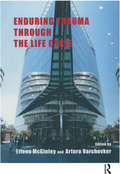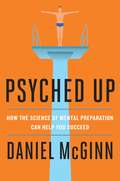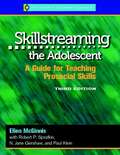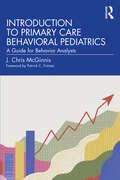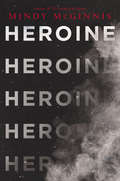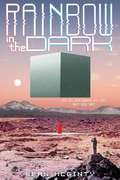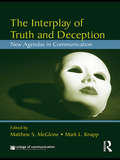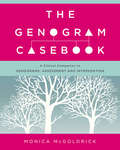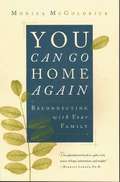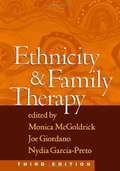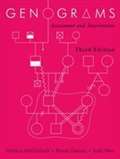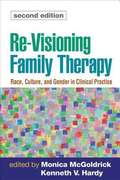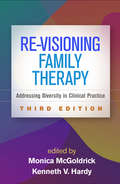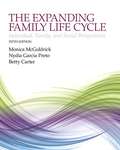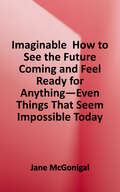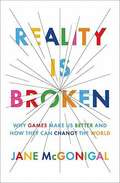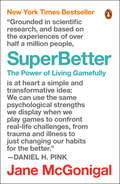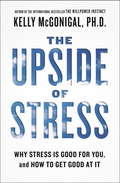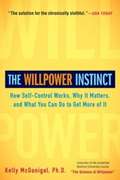- Table View
- List View
Enduring Trauma Through the Life Cycle
by Eileen McGinley Arturo VarchevkerThis is a multi-authored book on the complex subject of psychic trauma as encountered at different stages of the life-cycle, and describes some of the clinical challenges, technical issues and differing theoretical approaches that arise when working with the traumatized individual.The concept of psychic trauma is a complex subject, but one which has more recently gained prominence. This book contains a collection of papers which grew out of a series of talks given by the Psychoanalytic Forum of the British Psychoanalytical Society entitled Trauma Through the Life Cycle. The authors, all highly respected authorities in their fields, give insights into what we mean by psychic trauma, what constitutes a traumatic event, and the psychopathological sequelae to trauma at different stages of life. Judith Trowell and Nick Midgley look at the effects of infantile and childhood traumas. Catalina Bronstein and Sara Flanders, from differing psychoanalytic perspectives consider how childhood traumas can become reactivated in adolescence and colour subsequent developmental situations.
Psyched Up: How the Science of Mental Preparation Can Help You Succeed
by Daniel McginnClosing the sale. Asking for a raise. Nailing the big presentation. Of the 2,000 hours you work every year, your success or failure is determined in the couple of dozen crucial hours when you need to bring your absolute best. Will you?The last few minutes before a major challenge can be terrifying. Ever wished you knew how to make sure you ace the make-or-break test, audition, or interview?We often feel the most powerless just before we’re expected to act powerful. As you’ll learn in this life-changing book, practice might make perfect, but perfection is useless if you can’t summon it when it counts. Pulling off a great speech or the pivotal at bat also requires the right kind of mental preparation.In Psyched Up, journalist Daniel McGinn dives into the latest psychological research and interviews athletes, soldiers, entertainers, and others who, despite years of practice and enviable track records, will ultimately be judged on their ability to delivera solid performance when it’s their turn to shine. For instance, he reveals...• How Jerry Seinfeld’s jacket and Stephen Colbert’s pen help them get laughs.• What General Stanley McChrystal said to Special Forces before they entered the battlefield.• Why the New England Patriots hired the DJ from the Red Sox to help them win.Among other counterintuitive insights, McGinn reveals why trying to calm your backstage jitters can be worse for your performance than channeling it into excitement; how meaningless rituals can do more to prepare you in the final moments than last-minute rehearsal; and how a prescription from your doctor could help you unleash your best skills.Whether you’re a sportsperson or a salesperson, an actor or an entrepreneur, one bad hour can throw away months of hard work. There’s so much conflicting popular advice that we often end up doing the wrong things. McGinn separates the facts from the old wives’ tales and shares new, research driven strategies for activating your talent, optimizing your emotions, and getting psyched up to take the spotlight.
Skillstreaming the Adolescent: A Guide for Teaching Prosocial Skills
by Ellen McGinnisSkillstreaming the Adolescent employs a four-part training approach--modeling, role-playing, performance feedback, and generalization--to teach essential prosocial skills to adolescents. This book provides a complete description of the Skill streaming program, with instructions for teaching 50 prosocial skills.
Introduction to Primary Care Behavioral Pediatrics: A Guide for Behavior Analysts
by J. Chris McGinnisThis book is a comprehensive yet practical guide to the practice of primary care behavioral pediatrics for behavior analysts.Practitioners of this subspecialty work collaboratively with caregivers, educators, pediatricians, and pediatric specialists to bring about success for primarily neurotypical children experiencing difficulties with everything from sleep and cooperation to attention, anxiety, and toileting. This book reviews the historical and theoretical foundations of the subspecialty and provides practical guidance for problem conceptualization, assessment, case formulation, treatment planning, science-based behavioral treatment, caregiver treatment adherence, multidisciplinary collaboration, and ethical practice.A cornerstone for the field, Introduction to Primary Care Behavioral Pediatrics is essential for graduate students, practitioners of behavior analysis, and anyone interested in science-based pediatric behavioral healthcare.
Heroine
by Mindy McGinnisAn Amazon Best Book of the Month! A captivating and powerful exploration of the opioid crisis—the deadliest drug epidemic in American history—through the eyes of a college-bound softball star. Edgar Award-winning author Mindy McGinnis delivers a visceral and necessary novel about addiction, family, friendship, and hope. When a car crash sidelines Mickey just before softball season, she has to find a way to hold on to her spot as the catcher for a team expected to make a historic tournament run. Behind the plate is the only place she’s ever felt comfortable, and the painkillers she’s been prescribed can help her get there.The pills do more than take away pain; they make her feel good. With a new circle of friends—fellow injured athletes, others with just time to kill—Mickey finds peaceful acceptance, and people with whom words come easily, even if it is just the pills loosening her tongue.But as the pressure to be Mickey Catalan heightens, her need increases, and it becomes less about pain and more about want, something that could send her spiraling out of control.
Rainbow in the Dark
by Sean McGintyThe Wizard of Oz meets Ready Player One in this darkly comic YA novel about identity, depression, giving up, and finding your way home.High school senior Rainbow is trapped with three other teens in a game-like world that may or may not be real. Together, they must complete quests and gain experience in order to access their own forgotten memories, decode what has happened to them, and find a portal home. As Rainbow&’s memories slowly return, the story of a lonely teen facing senior year as the new kid in a small town emerges. Surreal, absurdist humor balances sensitively handled themes of suicide, depression, and the search for identity in an unpredictable and ultimately hopeful page-turner that's perfect for fans of Shaun David Hutchinson, Adam Silvera, and Libba Bray's Going Bovine.
The Interplay of Truth and Deception: New Agendas in Theory and Research (New Agendas in Communication Series)
by Matthew S. McGlone Mark L. KnappDuring the past 30 years, there have been a steadily increasing number of scientific and popular publications dealing with lying and deception. Questions about the extent to which public officials are deceptive are standard fare in current magazines and newspapers. This volume aims to present on a more precise conceptualization of this phenomenon, manifested in some well-known constructions like spin, hype, doublespeak, equivocation, and contextomy (quoting out of context). The contents of the volume have been generated for the New Agendas symposium at the University of Texas College of Communication, and all the authors are young, leading-edge researchers offering innovative perspectives and explorations of lying and deception in various contexts. This volume will appeal to scholars, researchers, and advanced/graduate students in communication, media, and psychology. It is written to the level of advanced undergraduates, and it is appropriate for use in courses covering lying and deception.
The Genogram Casebook: Assessment and Intervention
by Monica McgoldrickA long-awaited workbook companion to Monica McGoldrick’s highly successful textbook Genograms. This clinical companion to the bestselling Genograms: Assessment & Intervention uses case examples to articulate the most effective ways to use genograms in clinical practice. Widely utilized by family therapists and health care professionals, the genogram is a graphic way of organizing the mass of information gathered during a family assessment and finding patterns in the family system for more targeted treatment. For a client with cutoff relationships or a history of trauma, it can be hard to talk to a therapist about past and present relationships. Genograms are a non-intrusive and non-confrontational way to learn about a client's history and chart crucial, complex information for effective assessment and therapy. The Genogram Casebook deploys richly detailed case examples to address resistance to genograms, overcoming dysfunctional relationship patterns, working with couples, navigating issues of divorce and remarriage, using genograms in family sessions with children, repairing conflict and cutoff with family members, looking at the therapist's own family, and much more. It's a vibrantly practical, decisively essential guide to the use of genograms in mental health practice.
You Can Go Home Again: Reconnecting with Your Family
by Monica McGoldrick<p>Those who learn from the past are not condemned to repeat it. In this revelatory book, family therapist Monica McGoldrick explains how the use of genograms (family trees) can bring to light a family's history of estrangement, alliance, divorce, or suicide, revealing intergenerational patterns that prove more than coincidental. <p>McGoldrick's genograms of famous families, such as the Kennedys, Hepburns, Beethovens, and Brontës, complement discussion of the influence of birth order and sibling rivalry, family myths and secrets, cultural differences, couple relationships, and the pivotal role of loss. At the close of each chapter are questions that train the reader to think as researcher; with McGoldrick's guidance, we learn to mine previously untapped information about our own family patterns.</p>
Ethnicity and Family Therapy (3rd Edition)
by Monica Mcgoldrick Nydia Garcia-Preto Joe GiordanoThis widely used clinical reference and text provides a wealth of knowledge on culturally sensitive practice with families and individuals from over 40 different ethnic groups. Each chapter demonstrates how ethnocultural factors may influence the assumptions of both clients and therapists, the issues people bring to the clinical context, and their resources for coping and problem solving.
Genograms: Assessment and Intervention (3rd edition)
by Monica Mcgoldrick Randy Gerson Sueli PetryWidely used by both family therapists and health care professionals, the genogram is a graphic way of organizing the mass of information gathered during a family assessment and finding patterns in the family system for more targeted treatment. McGoldrick (director, Multicultural Family Institute) explains how to construct a genogram, do a genogram interview, and interpret the results. Genograms of famous families such as the Kennedys, the Fondas, the Freuds, and the Jungs, bring the text to life and help elucidate the principles of family systems theory and systemic interviewing, which form the basis of genogram work. This third edition is updated and expanded. It includes a new color insert and new material on the clinical applications of genograms.
Re-Visioning Family Therapy: Race, Culture, and Gender in Clinical Practice (Second Edition)
by Monica Mcgoldrick Kenneth V. HardyNow in a significantly revised and expanded second edition, this groundbreaking work illuminates how racism, sexism, and other forms of oppression constrain the lives of diverse clients -- and family therapy itself. Practitioners and students gain vital tools for re-evaluating prevailing conceptions of family health and pathology; tapping into clients' cultural resources; and developing more inclusive theories and therapeutic practices. From leaders in the field, the second edition features many new chapters, case examples, and specific recommendations for culturally competent assessment, treatment, and clinical training. The section in which authors reflect on their own cultural and family legacies also has been significantly expanded.
Re-Visioning Family Therapy, Third Edition: Addressing Diversity in Clinical Practice
by Monica McGoldrick Kenneth V. HardyA leading text for courses that go beyond the basics of family systems theory, intervention techniques, and diversity, this influential work has now been significantly revised with 65% new material. The volume explores how family relationships--and therapy itself--are profoundly shaped by race, social class, gender, religion, sexual orientation, and other intersecting dimensions of marginalization and privilege. Chapters from leading experts guide the practitioner to challenge assumptions about family health and pathology, understand the psychosocial impact of oppression, and tap into clients' cultural resources for healing. Practical clinical strategies are interwoven with theoretical insights, case examples, training ideas, and therapists' reflections on their own cultural and family legacies. New to This Edition *Existing chapters have been thoroughly updated and 21 chapters added, expanding the perspectives in the book. *Reflects over a decade of theoretical and clinical advances and the growing diversity of the United States. *New sections on re-visioning clinical research, trauma and psychological homelessness, and larger systems.
The Expanded Family Life Cycle: Individual, Family, and Social Perspectives (Fifth Edition)
by Monica McGoldrick Nydia A. Garcia Preto Betty A. CarterUpdated, expanded, and more comprehensive than ever, this new Fifth Edition a classic family therapy resource, The Expanded Family Life Cycle, gives readers a solid understanding of human development and the life cycle. Featured are a groundbreaking integration of individual development within a systemic context discussion of the increasing racial, ethnic, and cultural diversity across the life cycle in the United States today; life cycle perspectives on LGBT issues, alcohol, sexuality, migration, social class, violence in the family, and assessment of “home place” as fundamental to clinical work.
Imaginable: How to See the Future Coming and Feel Ready for Anything--Even Things That Seem Impossible Today
by Jane McGonigalWorld-renowned future forecaster, game designer, and NEW YORK TIMES bestselling author Jane McGonigal gives us the tool s to imagine the future without fear. An accessible, optimistic field guide to the future. --San Francisco Chronicle "Reading this book is like sitting down with a creative, optimistic friend--and getting up as a new version of yourself.""--Daniel H. Pink, New York Times bestselling author of When The COVID-19 pandemic, increasingly frequent climate disasters, a new war -- events we might have called ""unimaginable"" or ""unthinkable"" in the past are now reality. Today it feels more challenging than ever to feel unafraid, hopeful, and equipped to face the future with optimism. How do we map out our lives when it seems impossible to predict what the world will be like next week, let alone next year or next decade? What we need now are strategies to help us recover our confidence and creativity in facing uncertain futures.In Imaginable, Jane McGonigal draws on the latest scientific research in psychology and neuroscience to show us how to train our minds to think the unthinkable and imagine the unimaginable. She invites us to play with the provocative thought experiments and future simulations she's designed exclusively for this book, with the goal to: - Build our collective imagination so that we can dive into the future and envision, in surprising detail, what our lives will look like ten years from now - Develop the courage and vision to solve problems creatively - Take actions and make decisions that will help shape the future we desire - Access "urgent optimism," an unstoppable force within each of us that activates our sense of agency Imaginable teaches us to be fearless, resilient, and bold in realizing a world with possibilities we cannot yet imagine--until reading this transformative, inspiring, and necessary book .
Reality Is Broken: Why Games Make Us Better and How They Can Change the World
by Jane McgonigalVisionary game designer Jane McGonigal reveals how we can harness the power of games to solve real-world problems and boost global happiness. More than 174 million Americans are gamers, and the average young person in the United States will spend ten thousand hours gaming by the age of twenty-one. According to world-renowned game designer Jane McGonigal, the reason for this mass exodus to virtual worlds is that videogames are increasingly fulfilling genuine human needs. In this groundbreaking exploration of the power and future of gaming, McGonigal reveals how we can use the lessons of game design to fix what is wrong with the real world.Drawing on positive psychology, cognitive science, and sociology, Reality Is Broken uncovers how game designers have hit on core truths about what makes us happy and utilized these discoveriesto astonishing effect in virtual environments. Videogames consistently provide the exhilarating rewards, stimulating challenges, and epic victories that are so often lacking in the real world. But why, McGonigal asks, should we use the power of games for escapist entertainment alone? Her research suggests that gamers are expert problem solvers and collaborators because they regularly cooperate with other players to overcome daunting virtual challenges, and she helped pioneer a fast-growing genre of games that aims to turn gameplay to socially positive ends.In Reality Is Broken, she reveals how these new alternate reality games are already improving the quality of our daily lives, fighting social problems such as depression and obesity, and addressing vital twenty-first-century challenges-and she forecasts the thrilling possibilities that lie ahead. She introduces us to games like World Without Oil, a simulation designed to brainstorm-and therefore avert- the challenges of a worldwide oil shortage, and Evoke, a game commissioned by the World Bank Institute that sends players on missions to address issues from poverty to climate change.McGonigal persuasively argues that those who continue to dismiss games will be at a major disadvantage in the coming years. Gamers, on the other hand, will be able to leverage the collaborative and motivational power of games in their own lives, communities, and businesses. Written for gamers and nongamers alike, Reality Is Broken shows us that the future will belong to those who can understand, , and play games.Watch a Video
Reality Is Broken: Why Games Make Us Better and How They Can Change the World
by Jane McgonigalA visionary game designer reveals how we can harness the power of games to boost global happiness. With 174 million gamers in the United States alone, we now live in a world where every generation will be a gamer generation. But why, Jane McGonigal asks, should games be used for escapist entertainment alone? In this groundbreaking book, she shows how we can leverage the power of games to fix what is wrong with the real world-from social problems like depression and obesity to global issues like poverty and climate change-and introduces us to cutting-edge games that are already changing the business, education, and nonprofit worlds. Written for gamers and non-gamers alike, Reality Is Broken shows that the future will belong to those who can understand, design, and play games.From the Trade Paperback edition.
Reality Is Broken
by Jane McgonigalVisionary game designer Jane McGonigal reveals how we can harness the power of games to solve real-world problems and boost global happiness. More than 174 million Americans are gamers, and the average young person in the United States will spend ten thousand hours gaming by the age of twenty-one. According to world-renowned game designer Jane McGonigal, the reason for this mass exodus to virtual worlds is that videogames are increasingly fulfilling genuine human needs. In this groundbreaking exploration of the power and future of gaming, McGonigal reveals how we can use the lessons of game design to fix what is wrong with the real world. Drawing on positive psychology, cognitive science, and sociology, Reality Is Broken uncovers how game designers have hit on core truths about what makes us happy and utilized these discoveriesto astonishing effect in virtual environments. Videogames consistently provide the exhilarating rewards, stimulating challenges, and epic victories that are so often lacking in the real world. But why, McGonigal asks, should we use the power of games for escapist entertainment alone? Her research suggests that gamers are expert problem solvers and collaborators because they regularly cooperate with other players to overcome daunting virtual challenges, and she helped pioneer a fast-growing genre of games that aims to turn gameplay to socially positive ends. In Reality Is Broken, she reveals how these new alternate reality games are already improving the quality of our daily lives, fighting social problems such as depression and obesity, and addressing vital twenty-first-century challenges-and she forecasts the thrilling possibilities that lie ahead. She introduces us to games like World Without Oil, a simulation designed to brainstorm-and therefore avert- the challenges of a worldwide oil shortage, and Evoke, a game commissioned by the World Bank Institute that sends players on missions to address issues from poverty to climate change. McGonigal persuasively argues that those who continue to dismiss games will be at a major disadvantage in the coming years. Gamers, on the other hand, will be able to leverage the collaborative and motivational power of games in their own lives, communities, and businesses. Written for gamers and nongamers alike, Reality Is Broken shows us that the future will belong to those who can understand, , and play games. Watch a Video .
SuperBetter
by Jane McgonigalAn innovative guide to living gamefully, based on the program that has already helped nearly half a million people achieve remarkable personal growthIn 2009, internationally renowned game designer Jane McGonigal suffered a severe concussion. Unable to think clearly or work or even get out of bed, she became anxious and depressed, even suicidal. But rather than let herself sink further, she decided to get better by doing what she does best: she turned her recovery process into a resilience-building game. What started as a simple motivational exercise quickly became a set of rules for "post-traumatic growth" that she shared on her blog. These rules led to a digital game and a major research study with the National Institutes of Health. Today nearly half a million people have played SuperBetter to get stronger, happier, and healthier.But the life-changing ideas behind SuperBetter are much bigger than just one game. In this book, McGonigal reveals a decade's worth of scientific research into the ways all games--including videogames, sports, and puzzles--change how we respond to stress, challenge, and pain. She explains how we can cultivate new powers of recovery and resilience in everyday life simply by adopting a more "gameful" mind-set. Being gameful means bringing the same psychological strengths we naturally display when we play games--such as optimism, creativity, courage, and determination--to real-world goals.Drawing on hundreds of studies, McGonigal shows that getting superbetter is as simple as tapping into the three core psychological strengths that games help you build: * Your ability to control your attention, and therefore your thoughts and feelings * Your power to turn anyone into a potential ally, and to strengthen your existing relationships * Your natural capacity to motivate yourself and super-charge your heroic qualities, like willpower, compassion, and determination SuperBetter contains nearly 100 playful challenges anyone can undertake in order to build these gameful strengths. It includes stories and data from people who have used the SuperBetter method to get stronger in the face of illness, injury, and other major setbacks, as well as to achieve goals like losing weight, running a marathon, and finding a new job.As inspiring as it is down to earth, and grounded in rigorous research, SuperBetter is a proven game plan for a better life. You'll never say that something is "just a game" again.From the Hardcover edition.
SuperBetter: The Power of Living Gamefully Resilient--Powered by the Science of Games
by Jane McgonigalAn innovative guide to living gamefully, based on the program that has already helped nearly half a million people achieve remarkable personal growthIn 2009, internationally renowned game designer Jane McGonigal suffered a severe concussion. Unable to think clearly or work or even get out of bed, she became anxious and depressed, even suicidal. But rather than let herself sink further, she decided to get better by doing what she does best: she turned her recovery process into a resilience-building game. What started as a simple motivational exercise quickly became a set of rules for “post-traumatic growth” that she shared on her blog. These rules led to a digital game and a major research study with the National Institutes of Health. Today nearly half a million people have played SuperBetter to get stronger, happier, and healthier.But the life-changing ideas behind SuperBetter are much bigger than just one game. In this book, McGonigal reveals a decade’s worth of scientific research into the ways all games—including videogames, sports, and puzzles—change how we respond to stress, challenge, and pain. She explains how we can cultivate new powers of recovery and resilience in everyday life simply by adopting a more “gameful” mind-set. Being gameful means bringing the same psychological strengths we naturally display when we play games—such as optimism, creativity, courage, and determination—to real-world goals.Drawing on hundreds of studies, McGonigal shows that getting superbetter is as simple as tapping into the three core psychological strengths that games help you build: • Your ability to control your attention, and therefore your thoughts and feelings • Your power to turn anyone into a potential ally, and to strengthen your existing relationships • Your natural capacity to motivate yourself and super-charge your heroic qualities, like willpower, compassion, and determination SuperBetter contains nearly 100 playful challenges anyone can undertake in order to build these gameful strengths. It includes stories and data from people who have used the SuperBetter method to get stronger in the face of illness, injury, and other major setbacks, as well as to achieve goals like losing weight, running a marathon, and finding a new job.As inspiring as it is down to earth, and grounded in rigorous research, SuperBetter is a proven game plan for a better life. You’ll never say that something is “just a game” again.From the Hardcover edition.
The Upside of Stress
by Kelly McgonigalThe author of The Willpower Instinct delivers a controversial and groundbreaking new book that overturns long-held beliefs about stress. More than forty-four percent of Americans admit to losing sleep over stress. And while most of us do everything we can to reduce it, Stanford psychologist and bestselling author Kelly McGonigal, Ph.D., delivers a startling message: Stress isn't bad. In The Upside of Stress, McGonigal highlights new research indicating that stress can, in fact, make us stronger, smarter, and happier--if we learn how to embrace it. The Upside of Stress is the first book to bring together cutting-edge discoveries on the correlation between resilience--the human capacity for stress-related growth--and mind-set, the power of beliefs to shape reality. As she did in The Willpower Instinct, McGonigal combines science, stories, and exercises into an engaging and practical book that is both entertaining and life-changing, showing you:how to cultivate a mind-set to embrace stresshow stress can provide focus and energyhow stress can help people connect and strengthen close relationshipswhy your brain is built to learn from stress, and how to increase its ability to learn from challenging experiences McGonigal's TED talk on the subject has already received more than 7 million views. Her message resonates with people who know they can't eliminate the stress in their lives and want to learn to take advantage of it. The Upside of Stress is not a guide to getting rid of stress, but a guide to getting better at stress, by understanding it, embracing it, and using it.From the Hardcover edition.
The Willpower Instinct: How Self-Control Works, Why It Matters, and What You Can Do to Get More of It
by Kelly McgonigalBased on Stanford University psychologist Kelly McGonigal's wildly popular course "The Science of Willpower," The Willpower Instinct is the first book to explain the new science of self-control and how it can be harnessed to improve our health, happiness, and productivity.Informed by the latest research and combining cutting-edge insights from psychology, economics, neuroscience, and medicine, The Willpower Instinct explains exactly what willpower is, how it works, and why it matters. For example, readers will learn:Willpower is a mind-body response, not a virtue. It is a biological function that can be improved through mindfulness, exercise, nutrition, and sleep.Willpower is not an unlimited resource. Too much self-control can actually be bad for your health.Temptation and stress hijack the brain's systems of self-control, but the brain can be trained for greater willpowerGuilt and shame over your setbacks lead to giving in again, but self-forgiveness and self-compassion boost self-control.Giving up control is sometimes the only way to gain self-control.Willpower failures are contagious--you can catch the desire to overspend or overeat from your friends--but you can also catch self-control from the right role models.In the groundbreaking tradition of Getting Things Done, The Willpower Instinct combines life-changing prescriptive advice and complementary exercises to help readers with goals ranging from losing weight to more patient parenting, less procrastination, better health, and greater productivity at work.
The Willpower Instinct: How Self-Control Works, Why It Matters, and What You Can Do to Get More of It
by Kelly McgonigalBased on Stanford University psychologist Kelly McGonigal's wildly popular course "The Science of Willpower," The Willpower Instinct is the first book to explain the new science of self-control and how it can be harnessed to improve our health, happiness, and productivity.Informed by the latest research and combining cutting-edge insights from psychology, economics, neuroscience, and medicine, The Willpower Instinct explains exactly what willpower is, how it works, and why it matters. For example, readers will learn:Willpower is a mind-body response, not a virtue. It is a biological function that can be improved through mindfulness, exercise, nutrition, and sleep.Willpower is not an unlimited resource. Too much self-control can actually be bad for your health.Temptation and stress hijack the brain's systems of self-control, but the brain can be trained for greater willpowerGuilt and shame over your setbacks lead to giving in again, but self-forgiveness and self-compassion boost self-control.Giving up control is sometimes the only way to gain self-control.Willpower failures are contagious--you can catch the desire to overspend or overeat from your friends--but you can also catch self-control from the right role models.In the groundbreaking tradition of Getting Things Done, The Willpower Instinct combines life-changing prescriptive advice and complementary exercises to help readers with goals ranging from losing weight to more patient parenting, less procrastination, better health, and greater productivity at work.
The Willpower Instinct: How Self-Control Works, Why It Matters, and What You Can Do to Get More of It
by Kelly McgonigalBased on Stanford University psychologist Kelly McGonigal's wildly popular course "The Science of Willpower," The Willpower Instinct is the first book to explain the new science of self-control and how it can be harnessed to improve our health, happiness, and productivity.Informed by the latest research and combining cutting-edge insights from psychology, economics, neuroscience, and medicine, The Willpower Instinct explains exactly what willpower is, how it works, and why it matters. For example, readers will learn:Willpower is a mind-body response, not a virtue. It is a biological function that can be improved through mindfulness, exercise, nutrition, and sleep.Willpower is not an unlimited resource. Too much self-control can actually be bad for your health.Temptation and stress hijack the brain's systems of self-control, but the brain can be trained for greater willpowerGuilt and shame over your setbacks lead to giving in again, but self-forgiveness and self-compassion boost self-control.Giving up control is sometimes the only way to gain self-control.Willpower failures are contagious—you can catch the desire to overspend or overeat from your friends—but you can also catch self-control from the right role models.In the groundbreaking tradition of Getting Things Done, The Willpower Instinct combines life-changing prescriptive advice and complementary exercises to help readers with goals ranging from losing weight to more patient parenting, less procrastination, better health, and greater productivity at work.
The Willpower Instinct
by Kelly McgonigalBased on Stanford University psychologist Kelly McGonigal's wildly popular course "The Science of Willpower," The Willpower Instinct is the first book to explain the new science of self-control and how it can be harnessed to improve our health, happiness, and productivity. Informed by the latest research and combining cutting-edge insights from psychology, economics, neuroscience, and medicine, The Willpower Instinct explains exactly what willpower is, how it works, and why it matters. For example, readers will learn: Willpower is a mind-body response, not a virtue. It is a biological function that can be improved through mindfulness, exercise, nutrition, and sleep. Willpower is not an unlimited resource. Too much self-control can actually be bad for your health. Temptation and stress hijack the brain's systems of self-control, but the brain can be trained for greater willpower Guilt and shame over your setbacks lead to giving in again, but self-forgiveness and self-compassion boost self-control. Giving up control is sometimes the only way to gain self-control. Willpower failures are contagious--you can catch the desire to overspend or overeat from your friends--but you can also catch self-control from the right role models. In the groundbreaking tradition of Getting Things Done, The Willpower Instinct combines life-changing prescriptive advice and complementary exercises to help readers with goals ranging from losing weight to more patient parenting, less procrastination, better health, and greater productivity at work.
